- Clone
- UV4 (See other available formats)
- Regulatory Status
- RUO
- Other Names
- IL-6R1, gp80, IL-6 receptor alpha, IL-6R
- Isotype
- Mouse IgG1, κ
- Ave. Rating
- Submit a Review
- Product Citations
- 2 publications
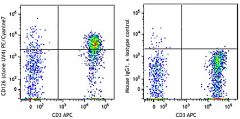
| Cat # | Size | Price | Quantity Check Availability | Save | ||
|---|---|---|---|---|---|---|
| 352809 | 25 tests | 128€ | ||||
| 352810 | 100 tests | 296€ | ||||
CD126 is an 80 kD IL-6 receptor α chain also known as IL-6R. It is a member of the immunoglobulin superfamily that is expressed on plasma cells, T cells, activated B cells, monocytes, granulocytes, hepatocytes, epithelial cells, and fibroblasts. Functional IL-6 receptors are formed by the non-covalent association of CD126 and the IL-6 receptor β chain (CD130 or gp130). CD126 binds IL-6 with low affinity but does not signal. The β chain (gp130, CD130) does not bind IL-6 by itself but associates with the α-chain/IL-6 complex to initiate signal transduction. IL-6 binding to the receptor complex results in the stimulation of B and T cells, and hematopoietic precursor proliferation and differentiation. A soluble form of CD126 has been found in human serum.
Product DetailsProduct Details
- Verified Reactivity
- Human
- Reported Reactivity
- African Green, Baboon, Cynomolgus, Rhesus
- Antibody Type
- Monoclonal
- Host Species
- Mouse
- Immunogen
- Human myeloma cell line U266
- Formulation
- Phosphate-buffered solution, pH 7.2, containing 0.09% sodium azide and BSA (origin USA)
- Preparation
- The antibody was purified by affinity chromatography and conjugated with PE/Cyanine7 under optimal conditions.
- Concentration
- Lot-specific (to obtain lot-specific concentration and expiration, please enter the lot number in our Certificate of Analysis online tool.)
- Storage & Handling
- The antibody solution should be stored undiluted between 2°C and 8°C, and protected from prolonged exposure to light. Do not freeze.
- Application
-
FC - Quality tested
- Recommended Usage
-
Each lot of this antibody is quality control tested by immunofluorescent staining with flow cytometric analysis. For flow cytometric staining, the suggested use of this reagent is 5 µl per million cells in 100 µl staining volume or 5 µl per 100 µl of whole blood.
- Excitation Laser
-
Blue Laser (488 nm)
Green Laser (532 nm)/Yellow-Green Laser (561 nm)
- Application Notes
-
Additional reported applications (for the relevant formats) include: blocking of IL-6 binding to IL-6R.
- Application References
-
- Huang YW and Vitetta ES. 1993. Hybridoma 12:621.
- Product Citations
-
- RRID
-
AB_2562716 (BioLegend Cat. No. 352809)
AB_2562717 (BioLegend Cat. No. 352810)
Antigen Details
- Structure
- Ig superfamily, associates with IL-6Rβ chain (CD130, gp130), 80 kD
- Distribution
-
Plasma cells, T cells, monocytes, hepatocytes, activated B cells, granulocytes, epithelial cells, and fibroblasts
- Function
- Stimulates T cells, B cells, and hematopoietic precursor proliferation and differentiation
- Interaction
- CD130, c-Src, STAT3, WWP1, WWP2
- Ligand/Receptor
- IL-6
- Cell Type
- B cells, Epithelial cells, Fibroblasts, Granulocytes, Monocytes, Plasma cells, T cells
- Biology Area
- Cell Biology, Immunology, Innate Immunity, Neuroinflammation, Neuroscience, Signal Transduction
- Molecular Family
- CD Molecules, Cytokine/Chemokine Receptors
- Antigen References
-
1. Taga T, et al. 1997. Annu. Rev. Immunol. 15:797.
2. Fitzgerald K, et al. 2001. The Cytokine FactsBook. Academic Press London.
3. Boulanger MJ, et al. 2003. Science 300:2101.
4. Gaillard JP, et al. 1993. Eur. J. Immunol. 23:820. - Gene ID
- 3570 View all products for this Gene ID
- UniProt
- View information about CD126 on UniProt.org
Related FAQs
Other Formats
View All CD126 Reagents Request Custom Conjugation| Description | Clone | Applications |
|---|---|---|
| APC anti-human CD126 (IL-6Rα) | UV4 | FC |
| PE anti-human CD126 (IL-6Rα) | UV4 | FC |
| Biotin anti-human CD126 (IL-6Rα) | UV4 | FC |
| Purified anti-human CD126 (IL-6Rα) | UV4 | FC |
| PerCP/Cyanine5.5 anti-human CD126 (IL-6Rα) | UV4 | FC |
| PE/Cyanine7 anti-human CD126 (IL-6Rα) | UV4 | FC |
| TotalSeq™-A0819 anti-human CD126 (IL-6Rα) | UV4 | PG |
| TotalSeq™-C0819 anti-human CD126 (IL-6Rα) | UV4 | PG |
| TotalSeq™-B0819 anti-human CD126 (IL-6Rα) Antibody | UV4 | PG |
| TotalSeq™-D0819 anti-human CD126 (IL-6Rα) Antibody | UV4 | PG |
Customers Also Purchased
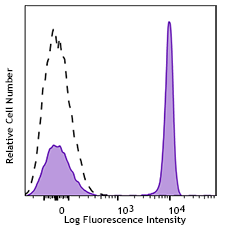
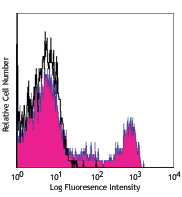
Compare Data Across All Formats
This data display is provided for general comparisons between formats.
Your actual data may vary due to variations in samples, target cells, instruments and their settings, staining conditions, and other factors.
If you need assistance with selecting the best format contact our expert technical support team.
-
APC anti-human CD126 (IL-6Rα)
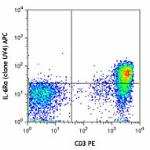
Human peripheral blood lymphocytes were stained with CD3 PE ... 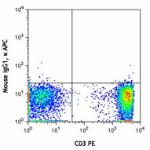
-
PE anti-human CD126 (IL-6Rα)
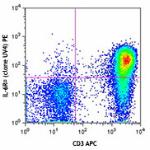
Human peripheral blood lymphocytes were stained with CD3 APC... 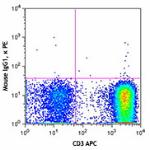
-
Biotin anti-human CD126 (IL-6Rα)
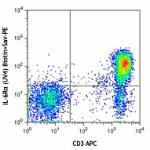
Human peripheral blood lymphocytes were stained with CD3 APC... 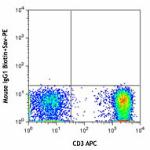
-
Purified anti-human CD126 (IL-6Rα)
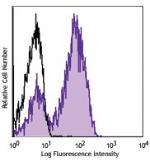
Human peripheral blood lymphocytes were stained with purifie... -
PerCP/Cyanine5.5 anti-human CD126 (IL-6Rα)

Human peripheral blood lymphocytes were stained with CD3 APC... -
PE/Cyanine7 anti-human CD126 (IL-6Rα)

Human peripheral blood lymphocytes were stained with CD3 APC... -
TotalSeq™-A0819 anti-human CD126 (IL-6Rα)
-
TotalSeq™-C0819 anti-human CD126 (IL-6Rα)
-
TotalSeq™-B0819 anti-human CD126 (IL-6Rα) Antibody
-
TotalSeq™-D0819 anti-human CD126 (IL-6Rα) Antibody

 Login / Register
Login / Register 











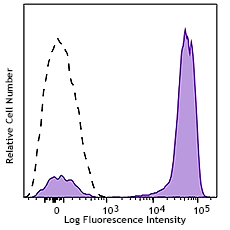




Follow Us